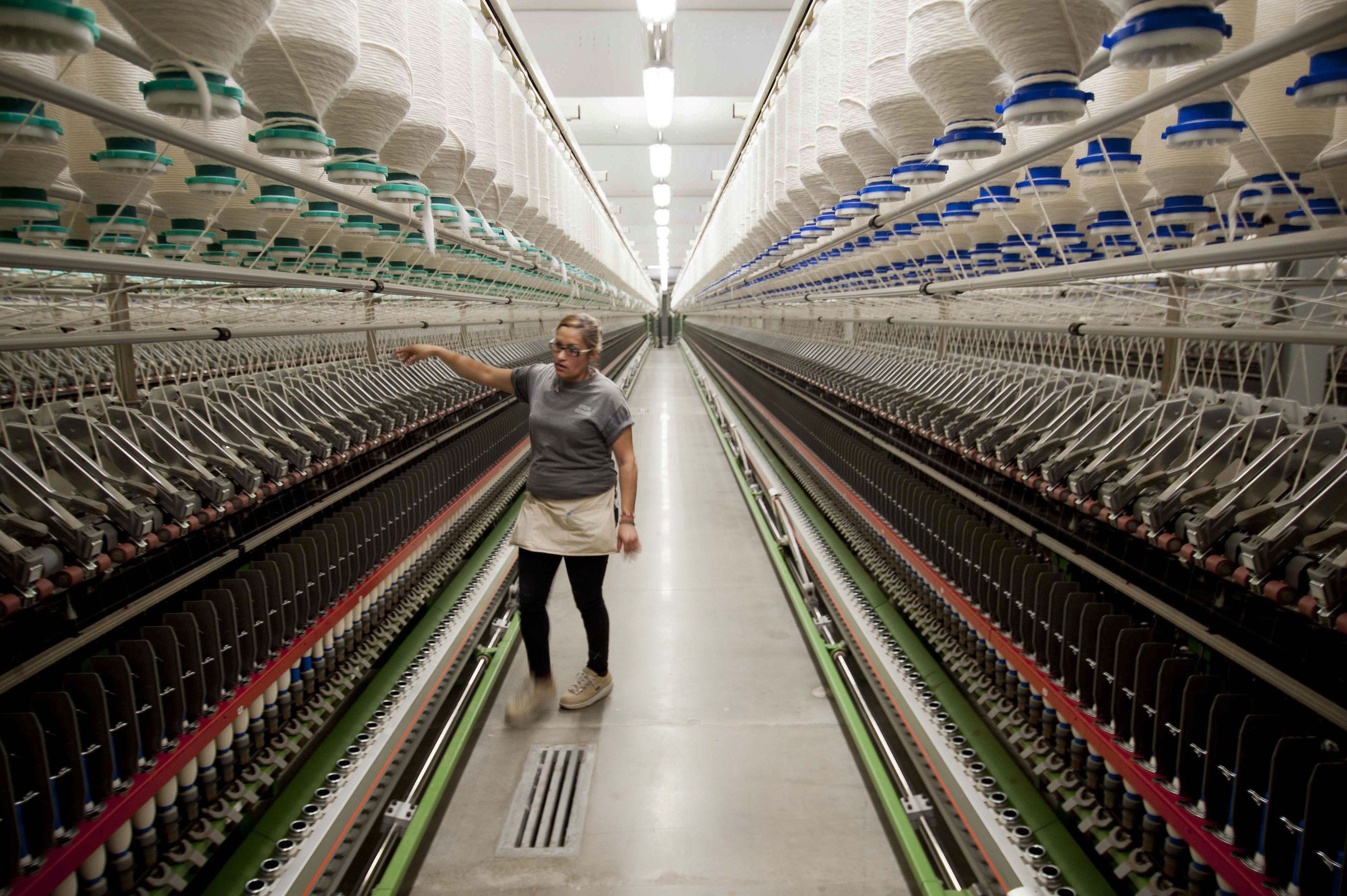Textile manufacturing returns to Rowan as part of resurgence in South
Published 12:00 am Sunday, March 2, 2014
SALISBURY — At age 16, Brian Tuck went to work for Cannon Mills.
The teenager was among thousands of area residents who worked in textile manufacturing at nearly two dozen mills and plants in Rowan County. Tuck entered the workforce when textiles was king and many thought the jobs that paid a decent wage and provided a good life would see them through retirement.
But in 2003, 23 years after he first stepped on the Swink plant floor in China Grove, Tuck lost his job when Cannon Mills’ successor Pillowtex shut down and eliminated 7,650 jobs at its North American factories and warehouses, including nearly 5,000 jobs in North Carolina.
Rowan County lost two mills and more than 700 jobs. Concord lost a mill and 600 jobs.
Tuck was out of work for about a year before finding a job making outdoor flooring. A friend offered him the chance to go back to work in textiles in Albemarle, but Tuck turned him down, thinking the industry was dying.
And for the most part, it was.
From 2003 to 2009, Rowan went from more than 1,200 jobs in 21 textile mills and plants to just 296 jobs in seven facilities. Across the South, about 650 textile plants shut down between 1997 and 2009 as cheaper labor drew jobs overseas, and plants that remained open became more automated, shedding laborers.
But a decade after many people eulogized the industry, textile manufacturing is on the upswing in Rowan County as part of a resurgence in the United States, especially across the South where companies find tax breaks and other incentives, dependable and low-cost utilities, good transportation networks and an experienced workforce.
Gildan Activewear is investing $250 million in three plants — two in Rowan and one in Davie County — and promising more than 500 jobs. Gildan’s high-tech yarn-spinning plant in the former PGT building on Heilig Road is up and running, with 120 workers on board and 70 more jobs to come in the next four months.
Since 2011, Tuscarora Yarns has nearly tripled its workforce in China Grove to more than 150 employees and invested close to $14 million in the former Hanesbrands building at 308 E. Thom St. Tuscarora plans to hire about 20 more workers in coming months.
Today, nearly 700 people in Rowan work in textile and apparel manufacturing, with 300 additional jobs on the horizon in the next two to three years.
“They are adding jobs here, coming back to levels we have not seen in 10 years,” said Robert Van Geons, executive director for RowanWorks Economic Development Commission.
Ten years after he lost his job at Pillowtex, Tuck went to work for Gildan in September 2013 as the maintenance manager for spinning and winding operations. He earned a degree from Catawba College while he was laid off and now supervises 28 workers.
Did Tuck ever think he’d see textile jobs return to Rowan County.
“To be honest with you, no,” he said.
But the rising cost of labor in China and other countries, combined with more costly and less reliable transportation and energy, have prompted textile manufacturers to consider American sites. More consumers are demanding “Made in the USA” on their towels, underwear and T-shirts, and retailers are responding. Walmart promised last year to buy $50 billion in American-made products during the next decade, among them towels and washcloths.
“The pendulum is swinging back,” said David Roberts, CEO for Tuscarora Yarns. “The erosion has stopped. Now, how far and how fast it comes back is anyone’s guess, but we certainly feel like it’s swinging back.”
Rowan will never see the textile job numbers the county boasted 20 years ago, when 3,853 people worked in mills, Van Geons said. Today, textile manufacturing is far more automated, demanding fewer employees but a larger investment in technology and equipment, he said.
The industry is also more diverse and dynamic than it was 20 years ago, making everything from bulletproof vests to conveyor belts to clothing, Van Geons said. Parkdale Mills, Thorlo, Granite Knitwear, Yale Rope and Thompson Screen Print all make textiles in Rowan County, as well as Promats and Fisher Athletics.
Manufacturing is now the second largest industry cluster in Rowan, behind health and education. Textile and apparel manufacturing together make up about 8 percent of the local economy.
A qualified workforce helped lure Gildan to Rowan and Davie counties, said Chuck Ward, senior vice president of yarn spinning. About 70 percent of the people Gildan has hired so far have previous textiles experience, Ward said.
Cheap and reliable energy also drew the Montreal-based company, as well as good transportation systems for both rail and truck, he said. The plants in Rowan and Davie will spin yarn and then ship it to distribution centers throughout the region, ultimately bound for Gildan’s textile facilities in Central America and the Caribbean where workers use the yarn to make T-shirts, activewear, fleece apparel and more.
The plant in the former PGT facility started spinning yarn last week and will ramp up to full production during the next six months, Ward said. The second Rowan plant, which will employ 180 people in 500,000 square feet, is under construction on the same property, and Gildan plans to begin installing machinery later this year with a substantial production ramp-up in 2015.
The Davie plant, where Gildan plans 290 jobs, is not under construction yet.
“These are very important investments for us,” Ward said. “They are an important part of our future and our future supply chain.”
Gildan’s announcement was the largest last year in North Carolina, where nine textile companies announced plans to build or expand in the state, creating 993 jobs and investing $381 million.
While people celebrate the return of textile manufacturing, Van Geons warns that the industry has changed substantially in the past 20 years.
“That industry they are thinking of is gone,” he said. “Today’s plant is completely different.”
While Rowan County has a textiles legacy and an experienced workforce, Van Geons said most people will need additional training to qualify for one of the new jobs at Gildan and Tuscarora or to fill jobs at Parkdale Mills and other plants.
“Today’s textile operation has more in common with the Daimler plant or Henkel than it does with yesterday’s textile operation,” Van Geons said. “What they need are workers who have good, basic skills in math and reading and some experience in manufacturing.”
As a generation of textile workers retires, Rowan County must be poised to provide trained employees who have the skills in demand by today’s advanced manufacturers, he said. (See accompanying article on job training.)
“We want those folks to be ready for those jobs,” which offer decent wages, good benefits and stable employment, Van Geon said.
Rowan County has a small window of opportunity to develop a training program with the capacity to prepare hundreds of people for textile jobs of the future, Van Geons said. The community needs to aggressively promote employment in the textile industry and recruit potential workers, he said.
“How do we meet that need for 300 workers in the next two to three years?” he said. “It’s been a long time since we needed 300 new workers that quickly in the textile industry.”
Finding qualified workers has become a challenge for Tuscarora, which is expanding in China Grove yet again and installing more equipment during the next 120 days.
“A lot of those trained people are now employed, and we are starting to see former textile people re-enter the workforce because they feel like there is a future again,” said Roberts, the company’s CEO.
The company will need 30 to 50 new workers during the next three to five years, Human Resources Director Phil Absher said.
“It has become a huge challenge,” Absher said. “… People need to know there is viable employment in textiles.”
Tuscarora has about a dozen positions open because the company does not have qualified applicants. Most are semi-skilled machine operator jobs that pay between $10 and $10.50 an hour, plus benefits and incentives.
To help spread the word, Tuscarora will participate in an upcoming job fair at Rowan-Cabarrus Community College. Company executives met with college officials as recently as Friday to discuss pre-employment training and how to lure qualified people into textile manufacturing.
Awareness and education are key, Roberts said. While the industry experienced a dramatic and lengthy downturn, the tide has changed and momentum in domestic textile manufacturing is growing, with good jobs available now and more coming in the future, he said.
Tuscarora, which has never operated facilities outside the United States, is responding to significant signs of growth in the industry by expanding capacity, Roberts said. Major brands and retailers are starting to shift their strategies away from Asia and focus on the western hemisphere.
Since manufacturers made a quick exodus to China 10 or 15 years ago, many have experienced inflation, an increase in labor costs and other problems including quality control and unreliable turnaround times. Moving textile operations abroad has not delivered the cost savings that many companies anticipated.
Once local workers realize that textile jobs are coming back to the South, “people will see that the future for the industry is bright,” Roberts said.
The textile jobs of today involve less manual labor and more analytical and technical skills, said Tuck, who compared his new position at Gildan with his former job at Cannon Mills.
Gildan employees go through training at the plant, as well as formal classroom training. The company also has employees help install the new machines alongside vendors.
“We thought one of the best ways to learn to use the machines was to install them,” Ward said.
Textile plants have become part of the United States’ high-tech manufacturing industry, said Van Geons, who predicted a strong future for the sector.
“As long as Americans buy socks and underwear and clothing and as long as we need textile products in fabric and furniture, there will be an industry that will continue to prosper,” he said.
While some marvel at the return of textile manufacturing jobs to Rowan, many others still do not realize the industry is employing hundreds of local people and will need hundreds more. Previous experience in textiles is an advantage, but not a guarantee, for a job seeker.
Tuck’s boss at Gildan worked with him at the Swink plant, and Tuck said he knows about eight other former Cannon Mills workers who have landed jobs at Gildan.
After telling people he would not work in textiles again if he could help it, Tuck said he became convinced by Gildan’s construction plans and investment that the company offered stable, good-paying jobs that would be here for years.
“The reason I came back was that the company was committed and had goals and a vision,” Tuck said. “… Who knows what tomorrow brings, but I felt confident about that decision then and I feel more confident about it today.”
Contact reporter Emily Ford at 704-797-4264.





